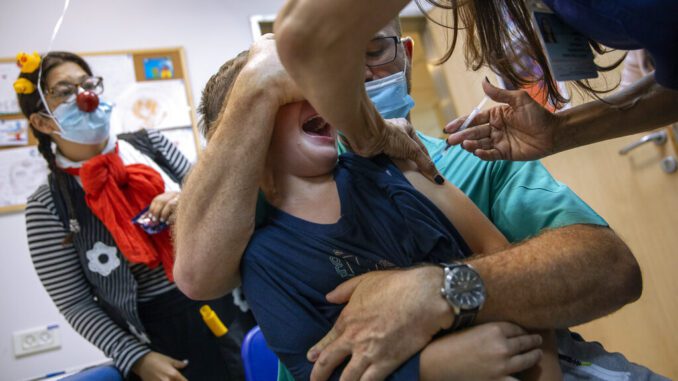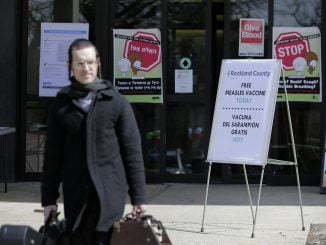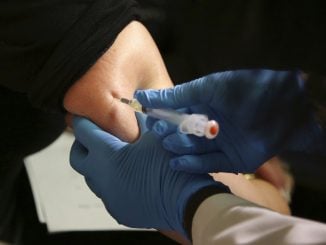
RALEIGH — The Centers for Disease Control and Prevention (CDC) officially added COVID-19 shots to the recommended childhood immunization schedule on Feb. 9.
Last fall, the CDC’s Advisory Committee on Immunization Practices (ACIP) voted to recommend the CDC add the shots to the schedule for children ages 6 months up through 18 years old.
Dr. Neil Murthy and Dr. A. Patricia Wodi authored the report recommending COVID-19 shots be added to the schedule.
“This means COVID-19 vaccine is now presented as any other routinely recommended vaccine and is no longer presented in a special “call out” box as in previous years,” Dr. Neil Murthy and Dr. A. Patricia Wodi said in a statement. “This, in a sense, helps ‘normalize’ this vaccine and sends a powerful message to both healthcare providers and the general public that everyone ages 6 months and older should stay up to date with recommended COVID-19 vaccines (including a booster, when eligible), just as they would with any other routinely recommended vaccine.”
As for booster shots, the CDC directs the public to its guidance on booster dose vaccination. As new boosters are approved, the guidance will list which boosters are recommended and for what age groups.
During a House Energy and Commerce Committee meeting on Feb. 8, CDC Director Dr. Rochelle Walensky was questioned by lawmakers about the shots.
In response to a question from Rep. Dan Crenshaw (R-TX) about why the shots were added to the schedule for the population least vulnerable to the disease, Walensky said the only reason they did it was in order to pay for COVID-19 vaccines for certain children.
“It was the only way it could be covered in our Vaccines for Children program,” Walensky told Crenshaw. “It was the only way our uninsured children would be able to have access to the vaccines. That was the reason to put it on the schedule.”
Walensky also said 2,000 children had died from COVID since the pandemic started but made no mention of the mounting reports of “sudden” deaths and vaccine injuries.
According to the 2020 Census, 331.4 million people are living in the United States and 73.1 million of them were under the age of 18.
“The CDC’s decision to add the COVID-19 vaccination to its schedule only further erodes public trust, as health experts and other countries have said there is ‘no clear benefit’ to vaccinating young children against the virus,” committee Chair Cathy McMorris Rodgers (R-WA) said in a statement following the meeting.
Rodgers also said that “Like we’ve seen throughout the pandemic, these actions could be used by state governments to undermine a parent’s right to make the best decisions for their children.”
The CDC’s immunization schedules are a summary of current vaccine recommendations for children, but do not set a vaccine requirements for schools. Requiring the COVID-19 shots for children under the age of 18 can only be done at the individual state level.
The North Carolina Commission on Public Health (NCCPH) is the body in that has the power to add the CDC’s COVID shot recommendation. The NCCPH is a division of the N.C. Department of Health and Human Services. (NCDHHS).
In the last year, the NCCPH has discussed the addition of COVID shots to the immunization requirements for the state’s K-12 children.
In fall of 2021, the commission was presented with a petition asking for all kids 17 and up to be required to take the vaccine to attend public schools and universities.
In February 2022, the commission unanimously voted down the petition with several members stating parents should make that decision for their children. At least one noted a lack of data and long-term studies on the adverse effects of the vaccines on kids.
The NCCPH’s rejection of the petition was bolstered by a letter to the chair from NCDHHS official calling the proposed action “premature.” The letter was signed by NCDHHS State Health Director Dr. Elizabeth Tilson as well as Mark Benton, the assistant NCDHHS secretary and Dr. Kelly Kimple, chief of the NCDHHS women’s and children’s health section.
The commission has not signaled any intent to add the COVID shots to North Carolina’s schedule since last February, however, the legislature has the power to intervene under the Administrative Procedures Act (APA) if a proposed rule change receives objections from 10 or more persons. Legislation has also been introduced in the N.C. House to bar schools and employers from requiring a COVID vaccination.
The next meeting of the NCCPH is set for May 3, however, the commission’s website does not yet list any details or a location.
The lack of meeting details is part of a distinct public transparency issue with the commission’s website.
In covering the activities of the commission, North State Journal has been routed through NCDHHS’ communications department for access to basic items such as meeting materials as the NCCPH website does not provide meeting videos, agendas, presentations or minutes.


